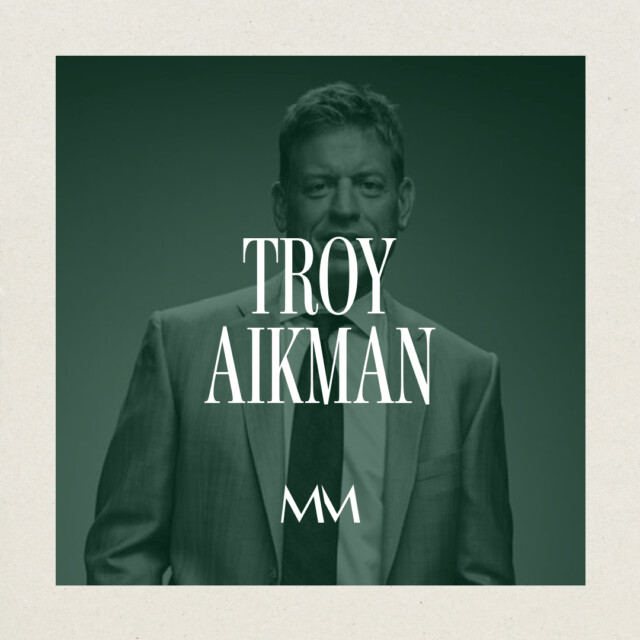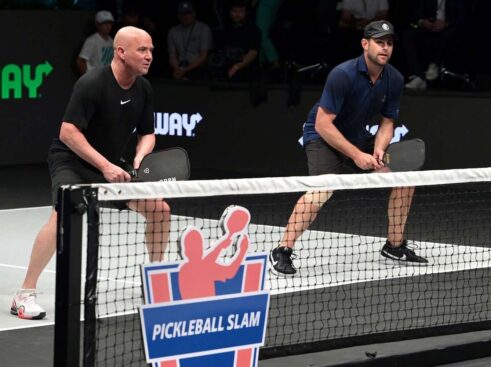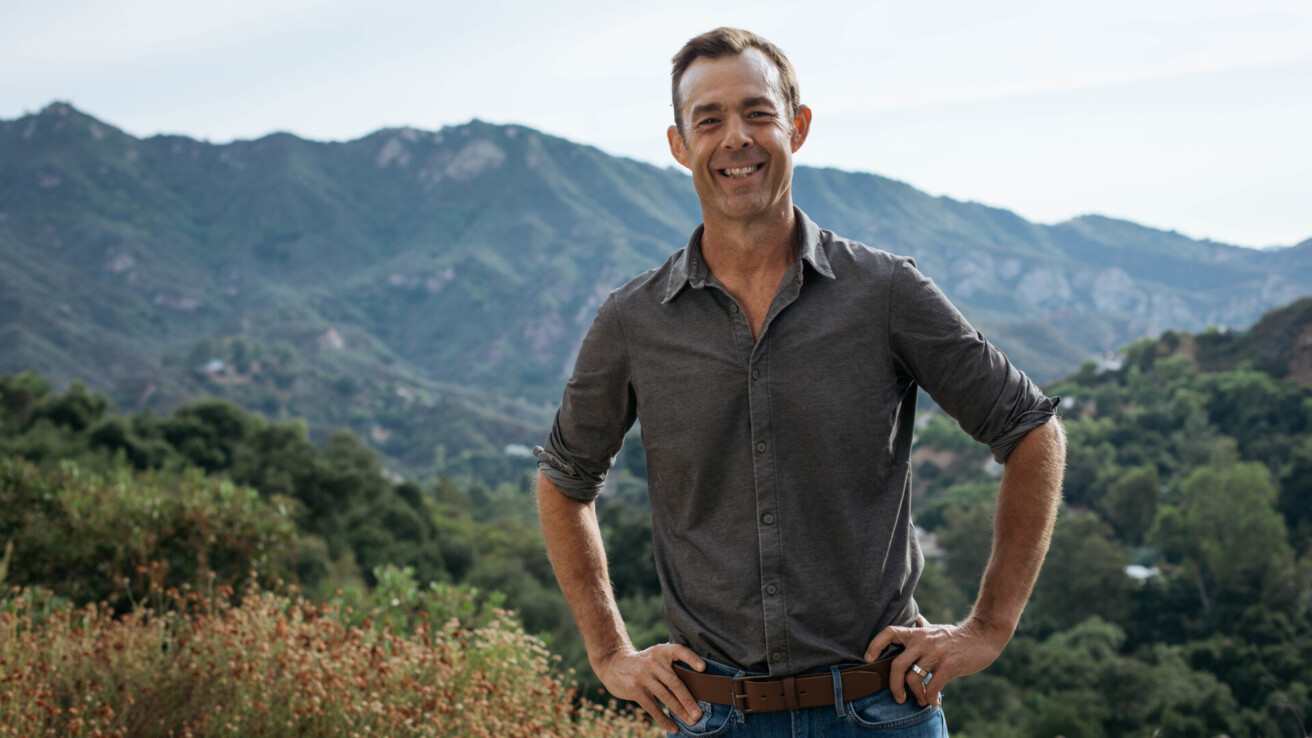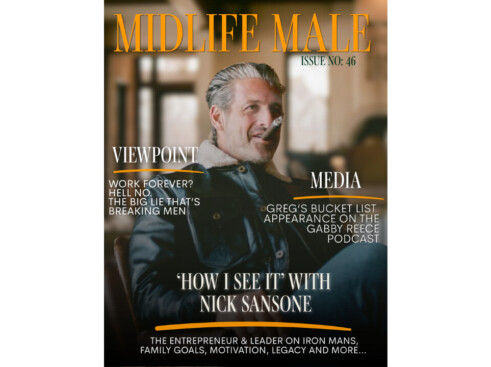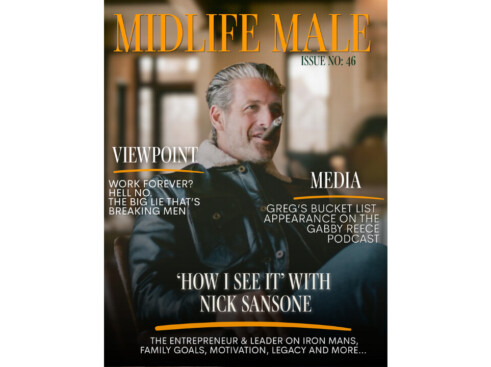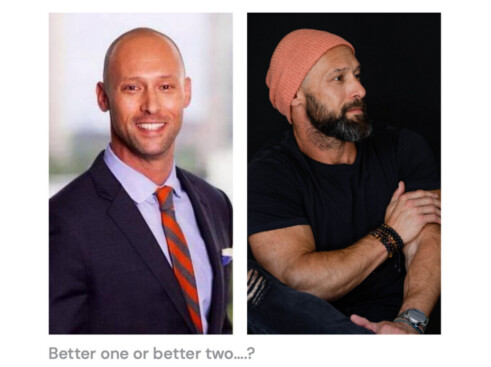Last week in Austin, I sat down with Jeff Krasno, co-founder and CEO of Commune, a masterclass platform for personal and societal well-being. He’s the host of the Commune podcast, where he interviews luminaries like Andrew Huberman, Marianne Williamson, Matthew McConaughey, and Gabor Maté. He also writes Commusings, a weekly essay on spirituality, wellness, and culture, reaching over a million readers every Sunday.
Jeff’s new book, Good Stress, details the wellness protocols that helped him reverse diabetes, lose 60 pounds, and reclaim his health at 50. Alongside his wife, Schuyler Grant, he runs Commune Topanga, a 10-acre retreat center offering yoga, cold plunges, saunas, and storytelling.
What struck me about Jeff was his depth—his words are intentional, his insights personal. He blends science with spirituality, moving effortlessly between biohacking and mindfulness. At his core, he’s a guy dedicated to bringing people together, sharing experiences, and making a positive impact.
Enjoy this week’s conversation with Jeff Krasno.
As always, the full unedited version is available to our Inner Circle members.
– Greg
How Jeff Sees It
MLM: Alright, Jeff, good to see you. Thanks for being here—I appreciate it.
Jeff Krasno: Yeah, no, my pleasure.
MLM: You’ve got a new book coming out, so let’s get into it. What made you want to do a book? I’ve written one. They’re incredibly rewarding and exhausting to write. When you talk about doing hard things and good stress—what drove you to put this together?
Jeff Krasno: Yeah, it started with intellectual curiosity, honestly. Then it turned into physical necessity pretty quick. I got really interested in where human physiology meets Eastern mysticism—how the hard data of the West mixes with the spiritual side of the East. That was more of a heady pursuit at first. But about five years ago, I got very, very sick—hit with a chronic disease diagnosis. So I had to dive into my own petri dish, become my own experiment. I call it “me-search” sometimes.
I went out, interviewed 300, 400 doctors, started pulling together everything I could learn from these brilliant people. I needed a place to store it all, and that turned into the fossil record we call a book. But I’ve also done a ton of other stuff—video content, journaling—because you get into these phases where curiosity takes over, you’re immersed, and then life pulls you somewhere else. Before I forgot it all, I wanted it down somewhere, in a way that could help others facing the same stuff I was. Unfortunately, from what I’ve seen, a lot of people are.
MLM: I’m listening to you, and I love it. It’s so similar in ways to where I found myself at 47—I’m 52 now. I hit this tipping point, same age my dad was when he passed away. From the outside, I had all this success, but I wasn’t content. No major health scare, but I wasn’t healthy. No financial crisis, but money wasn’t under control—things like that. For you, what does living a life well-lived look like every day?
Jeff Krasno: Such a good question, Greg. I think back to when I was 46—I woke up one early November day and decided, for a bunch of reasons, I was going to learn jazz piano. It tied into this bigger question of what made America great to begin with. There’s a lot of good answers, but for me, one was the Great American Songbook—our homegrown music, written by these brilliant composers. It brought people together around the radio for decades, no matter your class, race, creed, religion.
Everyone knew those songs, could hit the dance hall. So I thought, that’d be a fun project—learn that at a more advanced age, midlife, pick up a tough new skill like jazz piano. I set a goal: one song a week. At first, it was just plunking out melodies, but after 40, 50 weeks, I was a decent player. I got way better at learning over time.
MLM: This is fascinating. I keep working on the guitar and it’s hard. Were you surprised at how fast you picked it up?
Jeff Krasno: Well, growing up, we were told your brain stops at 25—slow decline after that, no new neurons, no new connections. Total malarkey, we know now. At 50, 60, 70, 80, you can still learn, grow, get better. That was cathartic for me—not because I’m some piano wizard, but because I saw growth and self-betterment are possible in midlife. It took accepting mistakes, having the guts to mess up. By your mid-40s, as a successful entrepreneur with accomplishments, you don’t like screwing up anymore. But mistakes are how we learn, how we grow. Biology backs that up—evolution runs on mistakes, mutations. Every so often, one’s adaptive nature picks it, iterates, improves the species. Same deal with human growth. I started embracing consistent mistakes with piano—screw up over and over, then nail it. That dopamine rush kept me going. Now I trust myself, even here in an interview—I don’t know the next word out of my mouth, but I’ve got enough foundation you won’t stop me. I might land on a mistake that’s a gem, a springboard for growth or a new idea. A lot of us fear that, especially later in life—making mistakes, especially publicly.
MLM: I want to circle back—you mentioned a health issue early on that kicked this off. Where are you with your health now? What did you do after all these interviews for your life, your health? You’ve got a family, all that—can you share a bit? I’m interested.
Jeff Krasno: Yeah, I was dealing with the boring, everyday symptoms of modern life—chronic fatigue, brain fog, irritability, couldn’t focus, always needing to check my phone. Then some hits to my vanity—70 pounds heavier, man boobs—my kids’ term, clinically gynecomastia. Had a gut, little brown skin tags under my armpits, which I later found out were early signs of insulin resistance. Then the diabetes diagnosis hit. I stuck a continuous glucose monitor on my triceps—got one on now, this little disc tracking blood sugar live. Checked the app—fasting glucose at 120, 130 mg/dL, right on the diabetes edge. Saw my primary care doc—she said, “Watch out.” I’d also had a hip replacement, tested my microbiome—gut was leaky as an old rusty pipe. That was at 49. Thing is, that’s not extraordinary in America—it’s ordinary, sadly. We’ve normalized the abnormal with health. But it sent me on a quest.
MLM: I’d imagine having kids really put your own health in perspective. I know I think about it all time. I want to be around for them as they get out of college and have lives and families of their own.
Jeff Krasno: Exactly right. I’ve got three teenage daughters—God help me—and I wanted to be healthy for me, but also for them to see behaviors that lead to well-being. They motivated me more than I did myself—wanted to leave footprints they could follow, internalize. Slowly, I adopted these protocols—what I call good stress—and started an upward spiral in my health. I didn’t know that existed—always heard about downward spirals, but upward ones are just as real once you align your lifestyle with your biology, your design. I asked myself, how did Jeff Krasno and my hunter-gatherer ancestors evolve? What conditions shaped this human organism’s adaptive mechanisms?
We evolved over hundreds of thousands of years as Homo sapiens—millions as hominids—with Paleolithic stress: temperature swings, scarce calories in winter, living in nature, community. We’ve stripped that out for ease and convenience. My thesis was, my chronic disease—and many others’—came from chronic ease. I had to self-impose deliberate good stress to get healthy, align how I live with how I was built.
MLM: What’s an example of that? What you’re describing hits a lot of guys—you’re not the outlier in your 40s, you’re the norm, unfortunately. What you’ve done is transformative—going from the 99th percentile of the average middle-aged American male to losing the weight, getting healthy with intention and purpose. For the guy listening who’s where you were, where does he start? How? He’s probably never heard “good stress”—we think stress is bad, something to avoid. We want to help these guys—what’s the first step, maybe second, third, the real things you did? I love the “why”—for family, daughters, yourself—guys get that. Where they struggle, Jeff, is the “how,” and that’s where you’re stepping in, really helping people.
Jeff Krasno: Yeah, there’s a few preliminary steps, then the protocols. First, take an honest inventory of who you are, the story you tell yourself. A lot of us think, “I was the chubby kid, a people-pleaser, I’ll never change.” You’ve got to tell yourself change isn’t just possible—it’s all that happens. We’re seven octillion atoms, Greg, with 37 billion billion chemical reactions a second—I’m not the same guy who started this call. Once you embrace that change is constant, you can steer it toward health, not disease. That’s step one before fasting or ice baths—realize you’ve got more agency than you thought, an upward spiral’s waiting. Then it gets tactical. For me, managing blood sugar, reversing diabetes, losing weight meant getting real about food. I started with fasting protocols—my go-to was a 16:8 intermittent fasting, time-restricted eating, squeezing food into an eight-hour window. Simple start. Diet changed too—I was honest, committing carbicide, eating way too many refined, ultra-processed carbs, starches, sugars. It’s so easy in our food system—cheap, everywhere. Minimize that, stop eating all day—you’ll see a big difference. Where it accelerated was combining a slightly ketogenic diet with intermittent fasting and a cold-water ice bath protocol, timed just right. My issue was blood sugar—cells weren’t taking glucose for energy, storing it as fat from insulin resistance. Fasting gave my pancreas a break from pumping insulin all day. Cool thing I learned: too much of any molecule builds resistance to it—insulin included. That break made my cells insulin-sensitive again, mitochondria more efficient, using energy, not storing fat. I cut carbs, then added ice baths—50, 52 degrees, not Wim Hof’s 34 when he crashed at my place for two weeks. Before breaking a fast, I’d get in. Hated cold my whole life, but there’s benefit in hard things. I’d gasp, core temp would drop, body kicked into thermogenesis to hit 98.6 again. Fasted, low on carbs, my mitochondria had no glucose—so it burned fat, turning stored triglycerides into free fatty acids for heat. Stacking those—man, I could almost see my body change. Four months, I went from Dad Bod to 25-year-old Jeff. Crazy. Added resistance training later—real change, blood sugar in check too.
MLM: I’ve got two follow-up questions, Jeff. One’s looking back—I’m just curious. The second’s more impactful, I think, for where we’re headed. First, I’m listening to you, and I’m like, how did you get there in the first place? You’re so damn smart—pardon my language—analytical, successful, all that. If a guy like you could get that close to diabetes, into it, overweight, all these things, I’m thinking, that could happen to anyone. That’s why it hits. Then the second part, what I think’s really key—why have you been so successful where so many other men struggle and fail?
Jeff Krasno: Yeah, interesting questions. The first one’s a bit easier to tackle, though I like doing hard things, so I’ll hit the second too. On the first, I’ve always been relatively intelligent—at least my grandmother thought so. But wisdom’s taking your own advice, and I wasn’t. It tied a lot to the story I told myself about myself—that’s why I started with that as a hurdle everyone’s got to cross. I grew up a chubby kid overseas, parents moving me around every six months—new school, new language, new clique. As a kid, you’ll do anything to fit in. I became the world’s best people-pleaser—that was my story. Even into my mid-to-late 40s, I was still that chubby kid, compromising anything authentic just to be accepted. Then I woke up—no, I don’t have to live that story. My fate’s not locked in my genes—screw that. Change is possible.
That wasn’t physiological, it was psychological, mindset. As a people-pleaser judging success through others’ eyes, I got obsessed with societal wins—growing companies, chasing the biggest festival gig. I ran Wanderlust—looked successful from outside, but inside, I wasn’t well at all. I was after this glittering diamond on the horizon—make $100 million top-line, then maybe I’d be liked, respected. Deep psychological stuff I had to untangle.
So I raised private equity round after round, lived on planes 220 days a year, coffee to wine o’clock, working nonstop—emails, texts, Slack—in the name of wellness. My journey into health and wellness became wealth and hellness. By 49, I was in sad shape, like I told you. Then I realized that kid trying to fit in was just doing his best—stop hating yourself for it. That weakness, that need to be liked, turned into my superpower: bringing people together. Wanderlust drew thousands; now with Commune, it’s the same deal. I didn’t even see it at first, but I built these containers for belonging because I craved it so much. Wild when I woke up to that. On the second—why I succeeded where others struggle—once you hit that upward spiral, it’s addictive, the momentum’s unreal. Five years ago, I couldn’t sit here with you like this—nervous, jittery, self-conscious, wondering if you liked me, if I was doing good. A lot of guys can relate. What gets you off the couch?
All we’ve got for free will is where we put our attention moment to moment. I didn’t pick my parents, country, era, religion, customs—none of that. Luck, misfortune, serendipity—it just happened. But I can control where I shine that spotlight. I stopped obsessing over 30 days or a year out, started focusing right here, right now—on behaviors that help, shape an environment where I thrive. Those little changes built, and I hit that upward spike.
MLM: So good. I’m sitting here listening, nodding along—I get it. Years ago, I couldn’t have just sat and listened without jumping in, interrupting, overthinking. By the way, I do like you, you’re doing great—same deal. It’s like a mirror. That was me, 47 to 50, then 50 to 52, that whole process. I love the transparency, the openness. What you’ve done with Wanderlust, Commune, even Eudaimonia—bringing people together—it’s not unique. Imposter syndrome, insecurity, wanting to be liked, figuring out where you fit, good stress versus bad, reducing fear of judgment or outcomes—it’s so prevalent. The widget doesn’t matter. I talk to hundreds of men now—different jobs, places, experiences—but what you’re saying feels universal, or at least damn common. It’s about reaching the masses, making change. We need to hear this, put in the reps of hearing it. I caught your “Who Am I” solo cast driving from Houston to Austin—awesome. Most guys don’t start there, don’t take that hard look in the mirror, can’t articulate it like you did, laying out this eloquent life resume.
Jeff Krasno: Yeah, it sounds soft, “vulnerable” for some guys. I hit the gym, work out with dudes pushing more weight than me—who cares if you’re unhappy or an asshole? You’ve got to train mentally too, not just physically. It’s easy to skip that. I’m a pull-up guy—love doing sets of 20, getting that rush, people noticing. It’s fun, pulling my own weight. You see results in the mirror—waist, muscles, DEXA scan, bioimpedance scale. Mental clarity? Compassion? Harder to measure. Social connections? Maybe if you’re geeky enough, you could metric it. But man, those are just as key to a happy, healthy life. I interviewed Bob Waldinger, director of Harvard’s Human Health and Happiness Study—tracked 238 men since 1938, yearly questions. My wife’s grandfather and JFK were in it. After 90 years, biggest data pile on health and happiness. I asked him, what’s the top factor? No hesitation—depth of social bonds and connections, period. Compelling, right? We work on physical fitness—do we work on social or psychological fitness? We need to. Resistance training, fasting, cold therapy, heat therapy, light timing—all critical. But in this era of loneliness, disconnection, we might need a social gym, a social fitness regimen alongside the physical. Yields big results.
MLM: You’re so right. Sweating’s my networking, the best spot for it. You’re piecing it together—guys can too—what’s possible, what’s probable, how to make it happen. I trained recently with Lance Armstrong, Tim Kennedy, fire-breathers, legends in midlife with millions of followers, dollars, achievements. My heart rate’s 150 in the warm-up, just being around them. No one cared if I took weight off the bar or sled—can you hang, are you a good guy? Lance had speed, Tim had strength—everyone brought something. The bond was shared interest: mental, physical, emotional, spiritual, financial health—all in the bucket. That’s the invite. Someone asked, “How’d you get there?” You see the outcome—not the five years it took to earn it. You’re making killer points. What do you want guys to take from the book? We’re running long, but what’s the takeaway to shorten that gap—reverse-engineer from “I’ve got to get out of bed, do this”?
Jeff Krasno: Reframing the life you’re really after. Sure, kicking back on the couch, 72 degrees, Netflix, DoorDash Ben & Jerry’s—nice sometimes. But that’s not the ease we want. Real ease is flow state—in the gym, on the tennis court, in deep collective work with guys, chasing something you believe in, losing track of time, fully there. That’s the true ease, the flavor of life. It’s not free—comes with inconvenience, discomfort. I want people to embrace that. Challenging yourself builds resilience, makes other hard things less hard. Jump in a 40-degree ice bath, manage that panic—then you can handle a tough talk with your partner, dad, mom, kids. Doing hard things makes other hard things easier. The world our hearts imagine is on the other side of that—lean into your discomfort’s edge.
MLM: This has been great, Jeff—really appreciate it.
